Josh Groban, Amber Ruffin, Arian Moayed, and other Tony nominees on gendered categories, Sondheim, and more
- Oops!Something went wrong.Please try again later.
- Oops!Something went wrong.Please try again later.
- Oops!Something went wrong.Please try again later.
- Oops!Something went wrong.Please try again later.
It's almost time for Broadway's biggest night.
After a massive 2022-2023 theatrical season, which saw Broadway returning to full strength for the first time since the 18-month COVID-19 shutdown, the Tony Awards have no shortage of excellent work to recognize. Whether it was a revival, a new work, a play, or a musical, the Great White Way was bursting with talent all season long.
EW rounded up some of those nominated talents — director Michael Arden (Parade), writer Amber Ruffin (Some Like It Hot), composer Jeanine Tesori (Kimberly Akimbo), and actors Josh Groban (Sweeney Todd: The Demon Barber of Fleet Street), Sara Bareilles (Into the Woods), Wendell Pierce (Death of a Salesman), Lorna Courtney (& Juliet), and Arian Moayed (A Doll's House) — to discuss their experiences in the footlights.
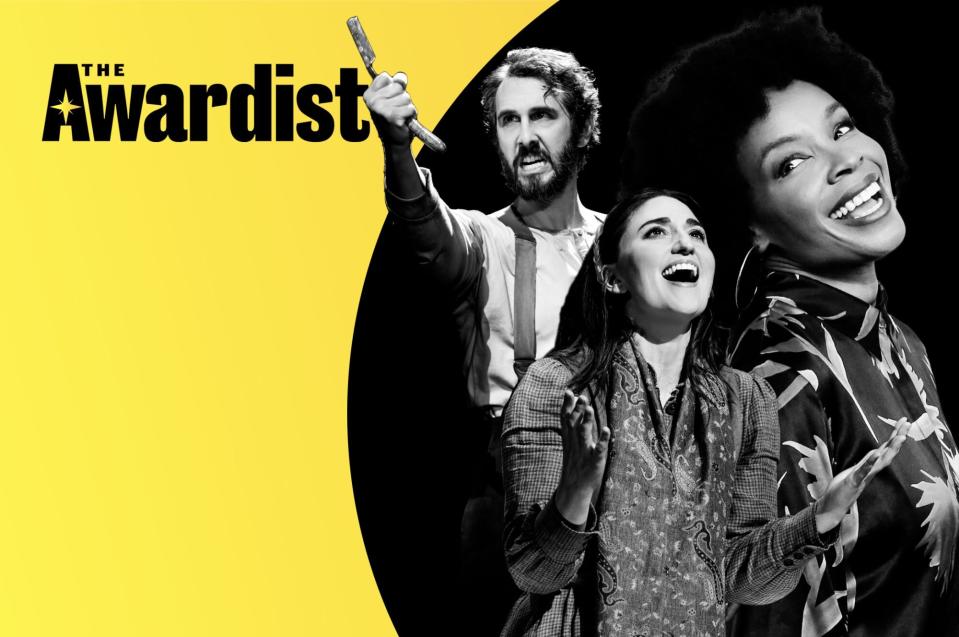
Matthew Murphy and Evan Zimmerman (2); LEONARDO MUNOZ/AFP/Getty The Tony Awards 2023 Awardist panel
For a time, the Tony Awards seemed in flux, denied a waiver amidst the WGA strike. But the show must (and will) go on June 11, without a script for the first time since the 1988 ceremony. (Note: This conversation was recorded before the WGA eventually permitted the awards to move forward with a televised ceremony.)
Even if you can't make it to New York, you can see some of the stage's brightest talents on the 76th Annual Tony Awards when they air live from the United Palace in New York's Washington Heights neighborhood on Sunday, June 11, at 8 p.m. ET on CBS and Paramount+. Ahead of the event, CBS and Pluto TV will present The Tony Awards: Act One, a live pre-show that begins at 6:30 p.m. ET.
But first, hear from some of the nominees below.
MICHAEL ARDEN (Director, Parade and A Christmas Carol): Some of us are nominated for new work and some for revivals. What are the challenges of approaching those different things? Do you find one easier than the other? Jeanine, I want to ask you this.
JEANINE TESORI (Composer, Kimberly Akimbo): I knew it, Arden. I knew you were coming for me. There are challenges in both. Because what you do with Parade and what happened with Into the Woods was, I know both pieces really well, and for both productions, they really taught us a new way to listen and to watch those shows. So it's a revisitation. For something new like Kimberly Akimbo, I have no idea how it's going to work. That's really scary because there are no guarantees at all. It's a different kind of fear that you're putting something in front of an audience. And we don't know how it's going to hit at the time. That's true for revivals and for new shows. It's not just the show; if you look at the history of musicals, some shows that didn't succeed in 1975 have now been running for 26 years, having opened 26 years ago. It's a gamble both ways.
WENDELL PIERCE (Willie Loman, Death of a Salesman): For Death of a Salesman, we approached it as we have an obligation to both. You have an obligation to all the themes and messages of the play that Arthur Miller wrote 73 years ago, but at the same time, you want to make sure to have some insight into why you're presenting it today. That's what a good revival should do. That's what a classic does. Long after we're gone, the humanity there will still speak to those who come after us. That's the thing that made Death of a Salesman a classic. And then, our interpretation heightened that with an African American family. If there's someone who knows how the American dream can become an American nightmare, it's from an African American experience. Without changing a word, it gave a new insight to it.
ARIAN MOAYED (Torvald, A Doll's House): With our version, it's also tricky because it's a new adaptation, so it's also a new play. I was one of the only members that didn't know A Doll's House. I had no relationship to that play. So, I had to weirdly approach it like a new play. But there's so much baggage with these characters because everyone knows these characters. Immediately when you say that you're playing Torvald in A Doll's House, everyone's like, "Well, I'm ready to hate him." You're battling with a lot of preconceived notions. But what's really cool with A Doll's House specifically — and why I think it's sadly still very relevant today — is that the themes that are so present-day are actually from Ibsen. It's crazy to see a play like that. I'm an Iranian immigrant, and so when the Iranians see the show, they think the show is about current-day Iran. People in New York are seeing the show that just went through a breakup. Even with a revival like A Doll's House, these themes feel even more present.
JOSH GROBAN (Sweeney Todd, Sweeney Todd: The Demon Barber of Fleet Street): The last time Sara and I were on Broadway, we were in two new works. I was in Dave Malloy's Great Comet of 1812; Sara was in and wrote Waitress. There's a number of fears and stresses to introducing something fresh and new and inviting people to expand to new work. Now we both find ourselves in widely beloved Sondheim revivals. The pressure there is great as well. It's yours to mess up in some ways. At the same time, you're also owing it to a piece that's considered a classic to put your own twist on it and to add freshness to it. As everybody else has said so eloquently, when you do that right, you're doing it for people who've seen it 50 times and you hope that they enjoy it as one of the versions that they're seeing. But the really fun thing is, when people haven't seen the work, and you know that for that night, for those few people, you're the one carrying the torch for that person who can then say that was their first. That is similar to doing a new work to introduce it to somebody.
ARDEN: I got the opportunity to work on a show Parade, which premiered in 1999, but only ran about a month and a half on Broadway. Most people are coming to it as a new piece of theater, even if they know the score. I have to interpret the piece but also start over with it. It's been an interesting challenge to both stand on the shoulders and let the piece stand on our shoulders at the same time. In juxtaposition, I also got to work on a new adaptation of A Christmas Carol, which is a story everyone knows and loves. The challenge with that piece was to give it a completely new context, especially coming out of COVID, about isolation and what it means to be alone. It's about responding to the piece as it was when it was written, but also responding to the time we are in now and making sure that those two things are in balance so that the audience ultimately isn't thinking about what's outside the theater or what existed before. They're on the ride in time with the story.
TESORI: You bring everything that you have with you in your pockets and your memory and your soul. It's this incredible, wonderful dance of new and old.
LORNA COURTNEY (Juliet, & Juliet): It's so creative how you can take something, a story like Romeo and Juliet, and bring in Shakespearean-style costumes, but also hip-hop dance styles and clothing styles. Every day I'm still growing as a person, I'm understanding myself more. That is changing my Juliet day to day. It's challenging because being in a Broadway show in and of itself is challenging. But we do it because we love telling stories and we love inspiring others. The energy that we give and that we receive fuels us.
AMBER RUFFIN (co-writer, Some Like It Hot): In writing the book of Some Like It Hot, it is an old piece, but it is becoming a musical. I enjoyed Some Like It Hot and was like, "Wow, what a fun property." Once it was on my shoulders to have people come to a theater and sit and watch it, I was like, "Oh, let's gut this thing." Almost instantly I was like, oh no, the art, the work we have to honor, but then, nope, turned on a dime. But the cool part of writing a book is, I could tailor it to this dude right here. Actors are such a huge part of the creative process. Because once you see it come out of somebody's mouth, it becomes a new North Star.
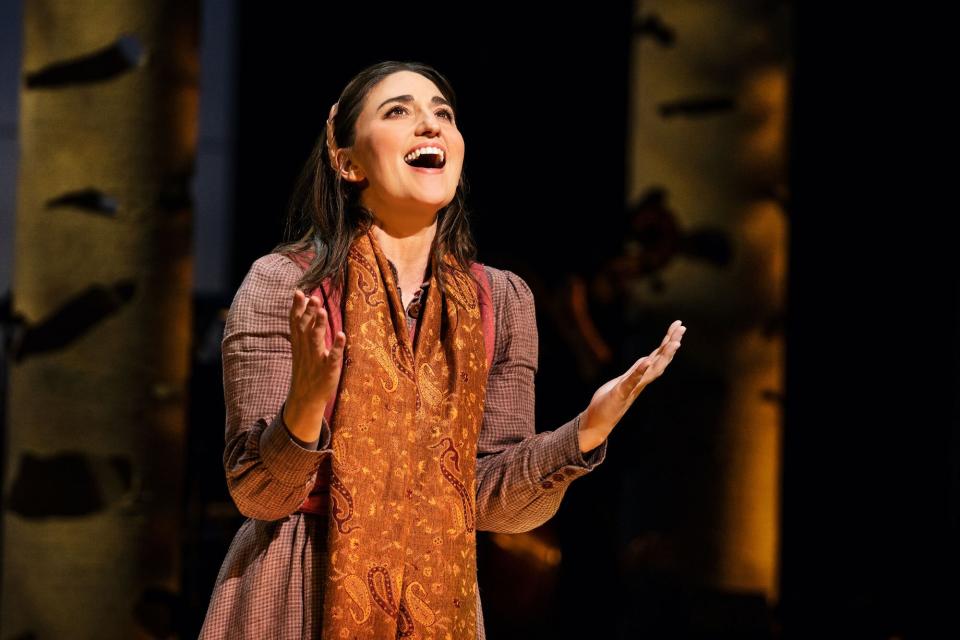
Matthew Murphy and Evan Zimmerman for MurphyMade Sara Bareilles in 'Into the Woods'
ENTERTAINMENT WEEKLY: Sara and Josh, you're both part of a recent wave of Sondheim revivals. Why do you think his work is striking such a chord right now?
SARA BAREILLES: (The Baker's Wife, Into the Woods): Because Into The Woods was the first production after [Stephen Sondheim's] passing, there was a lot of tenderness in and around the material. It heightened the sense of reverence to his legacy and wanting to hold the work sacred. To really honor the material in its truest form and try to stay very available to a really pure interpretation. The approach of our creative team was, let's put the orchestra dead center. There's no set. This is community theater adjacent. It is all about the words and music, this incredible script, this beautiful score, and wanting to honor the legacy and the impact of Steve's work. I never got to meet Steve, so he remains this monolith in my mind. I felt very intimidated, but really honored to get to go on the journey of telling that story. When you're dealing in fairy tales, there is something that elicits a very childlike response. Part of the resonance of this production had to do with the healing that people still need to do.
GROBAN: Steve did know that Into the Woods was happening though, right?
BAREILLES: Yes.
GROBAN: Same with Sweeney. I feel very privileged that we at least knew that he was excited and he knew that it was happening. He was aware that this work was going to have a resurgence and a revival, and that lots of new audiences were going to see it. Sondheim passed away two days before we were to start our first music workshop of getting it off the page. One of the great things that we regret is we don't get to pick his brain through the process of rehearsal. Because he writes in such puzzles, and even when you know work for 40 some years, there's always new things to discover. He has now entered that space of all great writers where it is now the opportunity of the actor to find those answers that you would've asked him in the text, to keep peeling that onion every single day. That's the nature of work as brilliant as his.
ENTERTAINMENT WEEKLY: Amber, how much did starting with a beloved movie impact your process?
RUFFIN: It is really popular nowadays to turn movies into musicals, which is only right, because every movie should be a musical. I firmly believe that. How much more fun would that be? But it was so scary at first to turn Some Like It Hot into a musical until [my co-writer] Matthew Lopez was like, "Look, I'm doing what I feel like doing and we can't be tied to this." And at some point, you gotta look at it, honestly, right? Wasn't nobody thinking about us when they wrote that movie. It does make you feel a little freer in your interpretation of it. If you love it the way Matthew Lopez truly loves that movie, then you will also do right by it. When you're straddling the actors and today and what the movie was and what it stood for, your love for that movie will make a great anchor that will allow you to soar. Because anchors famously allow people to soar. I'm a mess, but you get it.
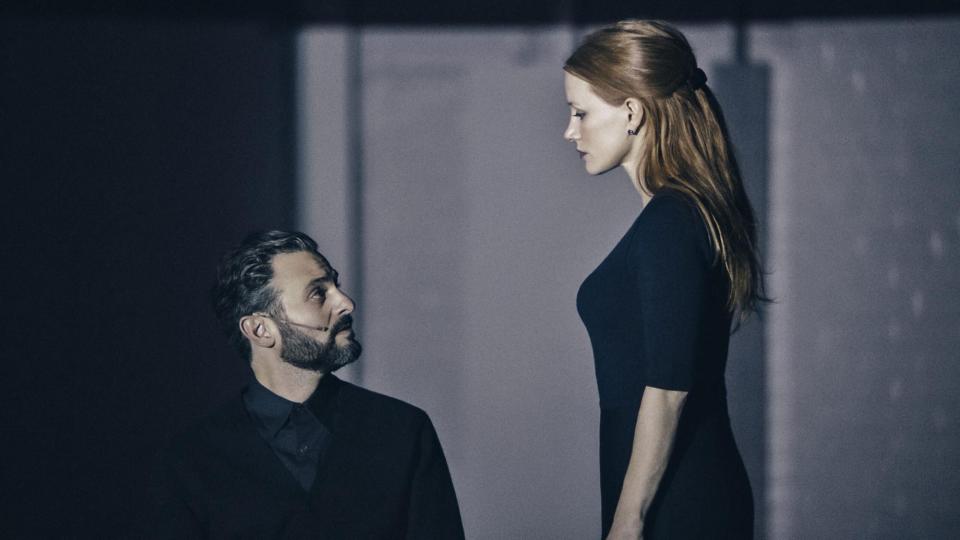
Courtesy of A Doll’s House Arian Moayed and Jessica Chastain in 'A Doll’s House'
ENTERTAINMENT WEEKLY: Arian, A Doll's House is ultimately a story about how money and power dictate our lives and twist up families. How much has your work on Succession influenced playing in this world but in a more domestic setting?
MOAYED: To be honest with you, I didn't really correlate them together in any which way, because I think that the thematic energies of Succession are pretty anti-capitalist and the sentiments of A Doll's House have more feminist leanings. I thought of them as different spiritual attacks on social norms. When I got offered this, I was going to go to Berlin to the biggest Iranian protest ever of 120,000 people outside of Iran. As I was reading the play, I could only think about Iran. To me, it was more about: How do I approach this play to tell the truth that my family members can get it and Western audiences can get it as well? The sad reality is that the pinpointing of the micro-cuts that men and people of power do on women all the time are more dangerous than the big, broader, Torvald-y things that we've known for generations. By going after those micro-truths, somehow or another, it talks to everyone. People are having their own DNA on it, and it's true to them. It feels it's coming from their own worldview and perspective.
So, sadly, I didn't take too much from Succession. The other thing is, I don't really understand much of the financial jargon that's happening there. It's all about: "I want this thing that you have and you want this thing that I have." That's basically the energy. Jeremy [Strong] knows everything about finances now. So, one time we're improvising and he's saying all of this stuff, he's like, "The derivative of the market value of the this and that." And I was like, I have no idea what he's saying. So, I said, "Why are you bothering me with this?" [Laughs] That gives you an idea of how much I understand.
GROBAN: Amber, can't wait for Succession: The Musical. The rhyming potential of those words, it's phenomenal.
TESORI: So much rhymes with derivatives, let's start there.
ENTERTAINMENT WEEKLY: So what you're saying, Arian, is that A Doll's House dramaturgically makes more sense to you than Succession.
MOAYED: [Laughs] It does, actually. It does.
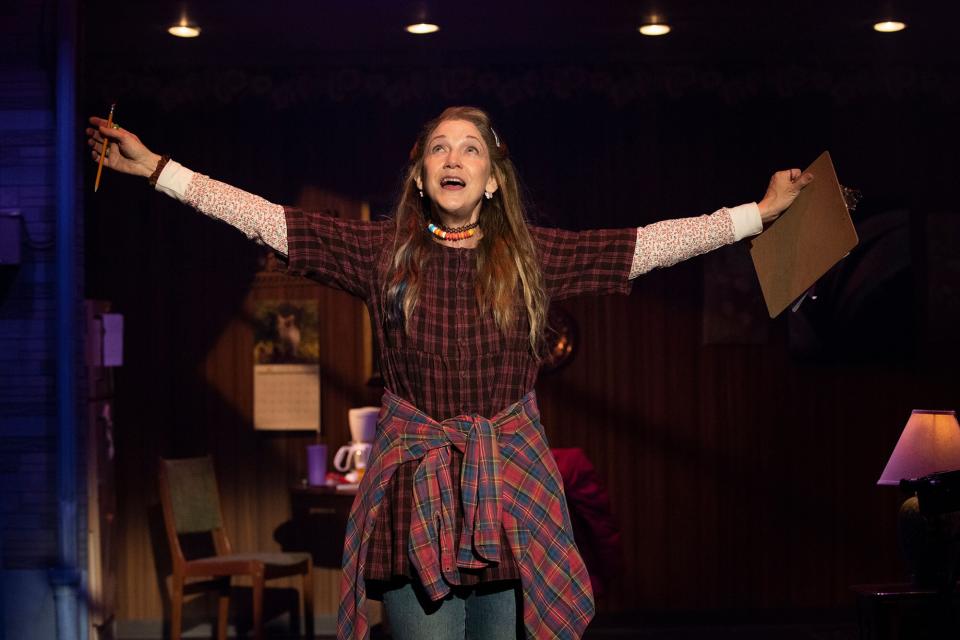
Ahron R. Foster Victoria Clark in 'Kimberly Akimbo'
ENTERTAINMENT WEEKLY: Jeanine, you're the most honored female composer in Broadway history, but does this one hit different for you?
TESORI: It's just because I'm old. Look, I grew up in the pit. I started out studying science. I'd never even seen a musical, I didn't know what the hell a musical was. I played field hockey and tried to keep my distance between me and my Sicilian father. This is my seventh Broadway score, and I'm so amazed that each one is so different. They're like having kids, and each kid, they tell you what they need. I tend to write shows that, like Toni Morrison said, "I want to write what I want to see." As I age, I want to see, especially, women and female-identifying protagonists centered.
Kimberly Akimbo is based on a beautiful play that David Lindsay-Abaire wrote right out of school. I love working with playwrights. I love writers because they're generally smarter than I am. In the beginning, there was the word. That's why there's a strike right now. But there's this idea that as women age that we're asking them to sustain something that's not sustainable as opposed to celebrating that wisdom looks different. I know so many badass older women who have that twinkle in their eye. I wanted to write the show for many reasons, but mostly because of my Nona, who was taken out of school when she was 12 to cook. She always had this unbelievable glint in her eye because I feel like she always remained the age that she was when she was taken out of school. She used to look in the mirror and say, "I cannot believe I'm not 10 years old." And I thought, "Isn't that a great way to look at the way that the world looks at us as women as we age and the way that we feel inside?"
ENTERTAINMENT WEEKLY: Wendell, I saw you tweet about entering the company of the few who have played Willie Loman on Broadway – what does that mean to you to hold that rarefied air, and particularly, what does it mean to be the first Black actor to do so?
PIERCE: It is a great honor to be in the company of this small fraternity of men who have played the role on Broadway. To know you are in the company of Lee J. Cobb, George C. Scott, Dustin Hoffman, Brian Dennehy, and Phillip Seymour Hoffman is a great honor. When it comes to being the first African American to play it, when I hear that, it should be an embarrassment. Americans go, "Wow, this is the first woman to do this, this is the first Black man to do that." It's actually an acknowledgment of our ignorance and intolerance. It shouldn't be a badge of honor. There should be a badge of shame. I think about another group of men who, because of that ignorance of cultural prohibition never got to play the role — James Earl Jones, Roscoe Lee Brown, Earle Hyman, Harry Belafonte — how much we missed out on. What we should always remember is that the more specific you are in your interpretation and your story, the more universal it becomes. I thought of those two groups of men when I was doing the role — the small fraternity that I joined, and the fraternity of men whose performances we'll never know. I felt a great obligation to both.
How do you acknowledge and meet that obligation? You think of one man who wrote this uniquely truthful story, and that's Arthur Miller. You do the play. When you do the play, it magnifies all the things that you bring to it. One thing I really fought for was they thought that the woman Willie has the affair with should not be a white woman and should be a Black woman. I said, "Oh, no, so much more is at stake — the danger of a Black man having an affair with a white woman in 1932 in Boston." That heightens everything. While I am maybe rubbed the wrong way, when I hear the first African American interpretation, I realize how historic it is. There's a paradox in that — the paradox of the American dream itself, of, when does that dream become a nightmare?
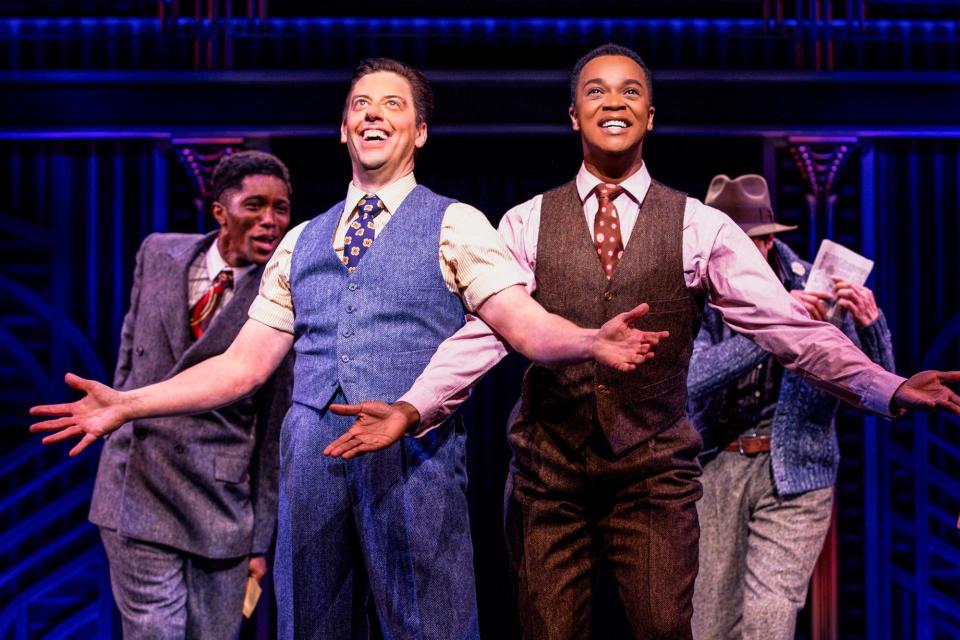
Marc J. Franklin Christian Borle and J. Harrison Ghee in 'Some Like it Hot'
ENTERTAINMENT WEEKLY: Amber and Lorna, both of your projects feature non-binary actors, one of whom accepted a nomination in a gendered category (J. Harrison Ghee) and one of whom removed themselves from contention (Justin David Sullivan). What are your thoughts on gendered categories and making space in the awards race for everyone?
RUFFIN: Sometimes the question comes up of should our categories be gendered. I'm so severely spoiled that I couldn't even begin to imagine the amount of thinking and work and research and people you would have to talk to in order to be able to answer the question of, "Should these categories be gendered?" The answer is, "Doesn't it seem like one of the things we will be saying was silly in the future?" Every once in a while you run into something and you go, "Hmm, yeah, that's severely now. But it's also quite old." I fear gendered categories might become that. But again, I shouldn't have said s--- because I'm not a part of that group. Lorna, what do you say when people ask you about that?
COURTNEY: I mean, this is the 76th Tony Awards. Seventy-six years have passed and a lot has changed since then. What I love about our show is — and Amber's show — is that it embraces inclusivity and diversity in so many different ways. So many people message me thanking us for shedding so much light and giving space to people, for giving them a voice and allowing them to see themselves in the people on stage. I don't believe that there should be gendered categories. I call myself an actor, right? So it should just be that. But I feel so blessed and honored to represent a show that is all about inclusivity and positivity and uplifting and encouragement.
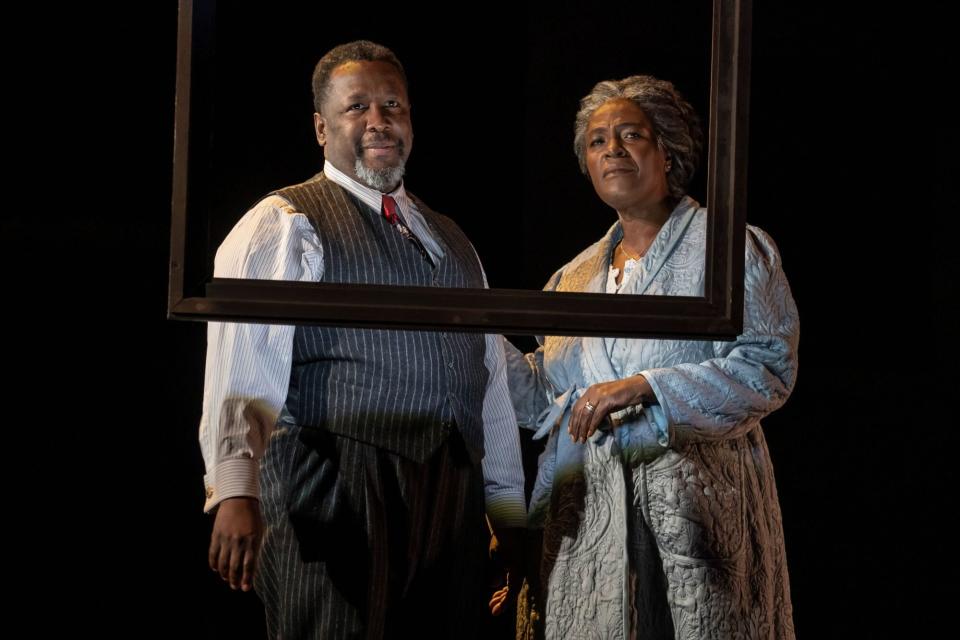
Joan Marcus Wendell Pierce and Sharon D. Clarke in 'Death of a Salesman'
ENTERTAINMENT WEEKLY: Wendell, how did the grandiose history of the role and the play factor into your approach?
PIERCE: This idea of how it's done and who has done it is so rarefied that the only chance I would ever have is to approach it like a new play. To say, "Listen, bring whoever you are to it." One of the first things that sparked my imagination was, we have this cultural expectation of how it's played. Willie Loman's slow dirge to death. But when I entered the rehearsal hall, the first impulse I had when I would confront all of the obstacles placed in front of me was to fight hard. And the harder it became to fight even more, to fight with your last breath. It became the complete opposite of how the role over 70 years has traditionally been done. We know what's happening from the title Death of a Salesman. My impulse was, in spite of everything, I'm going to fight. Culturally, for me, it was my father, it was my uncles. It was all the men in my life who had no reason to dream that they would be able to accomplish anything they wanted to in the country that they loved that didn't love them back. A great-uncle of mine sued when he was lynched. He was having an affair with a woman that another white man was having an affair with. And they lynched him and my grandfather saved him, and he actually sued them and won. The audacity to think that he could do that, those were the men that culturally I brought to the role that dispels any other interpretation that I knew.
ENTERTAINMENT WEEKLY: Amber, how did you want to put your own stamp on Some Like It Hot?
RUFFIN: I can't wait for the Death of the Salesman musical. [Laughs] Um, no, the thing about Some Like It Hot that really bugged me so bad — I mean, like, 50 things — but it was how doofy Marilyn Monroe is. I rage so hard against it. I was like, "No corner of this woman can be an idiot." You can't be tricking ladies into bed anymore. You can't smile and forgive that at the end of a show. But once you put some support under her, once she was a more honest human being, then it became very, very fun. She became more than an ingenue, and this wheeling and dealing savvy lady. It is odd when sometimes people honor things that are bad for them. Just because that's the way it's been done, that's no excuse to do anything. Once you decide to do things your own way, people don't care. People are concerned with you having a great time doing the thing you love the most. No one wants you to be confined into some little dumb box. Busting Sugar out of that role really hit home for me. It made me feel like, "Oh, people want people to succeed. We're all little baby huggy bears who want the best for each other."
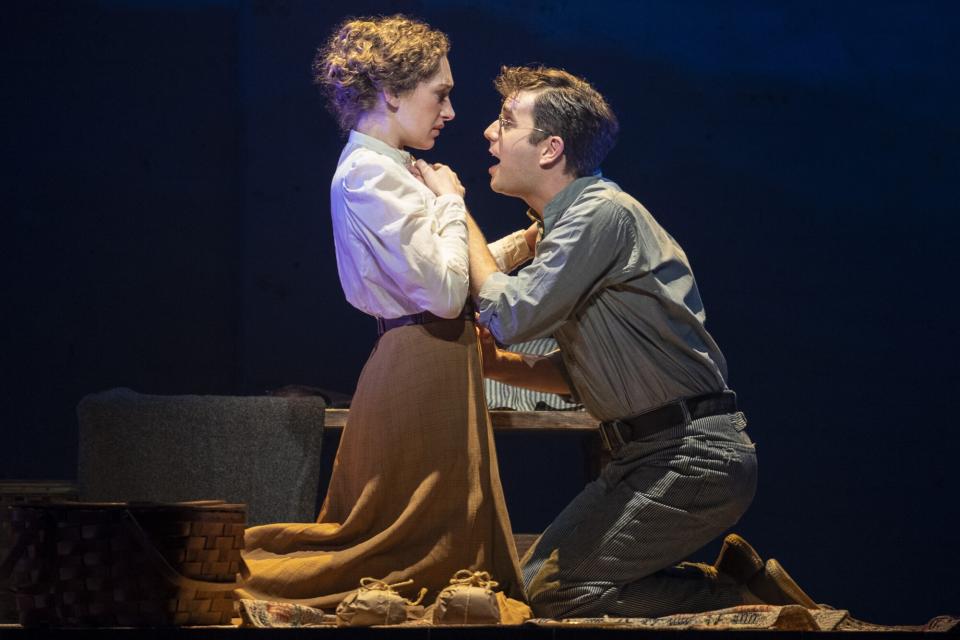
Joan Marcus Micaela Diamond and Ben Platt in 'Parade'
ENTERTAINMENT WEEKLY: Michael, you have almost entirely directed revivals professionally. What is it that draws you to that specifically?
ARDEN: Writers are just impossible to work with usually, so it's easier if they're either dead or not in the room. No, I'm kidding. [Laughs] I love the history of theater. I love what a revival can be, which is a true reinvention that we are looking through our current lens at our past in order that our future might be different. That's what draws me to revivals. I'm not as interested in entertainment as I am in examination. With Parade, I'm attracted to it because it gives me an opportunity to turn over stones. When I've worked on new pieces, your main job is to get this new story across, make it clear, make it emotional, connect to the audience, and take them on a journey. Whereas with revival, I get to do that, but I also get to dig up my heroes a little bit and ask them questions or get cheeky with what they've done. I'm kind of a s---stirrer in that sense. I'm a little baby in this business a little bit, and I am learning so much from this great material. I'm hopefully gaining the tools to develop new work in ways that have a reference of the past. My grandparents raised me. I grew up in Midland, Texas, and they worked in a World War II history museum and restored old planes. I've always been interested in the past and history, so maybe that's why I gravitate toward that stuff.
ENTERTAINMENT WEEKLY: Lorna, you are in a unique position in that the source material of your show is Romeo and Juliet and the score is Max Martin pop songs, but it's those two things mashed together in a new story. Does that pre-existing material make your job easier or harder?
COURTNEY: My job is made so much easier because both Max Martin and David West Reed are wonderful, amazing writers in their own right. Shakespeare, we all know, stands the test of time. But the comedy and the themes that are in Max Martin's songs do too. I'm still discovering, and every day I'm listening. It all works together so bizarrely. When I do come out and put on headphones, I put on the headphones to block out the giggles when they hear me saying, "Oh, baby, baby, how was I supposed to know?" But they're listening to the words. I took the songs, and I wrote them out as complete thoughts with periods, exclamation points, and commas. That way I understand what I'm saying, so that the audience can understand Juliet's story and full complete thoughts.
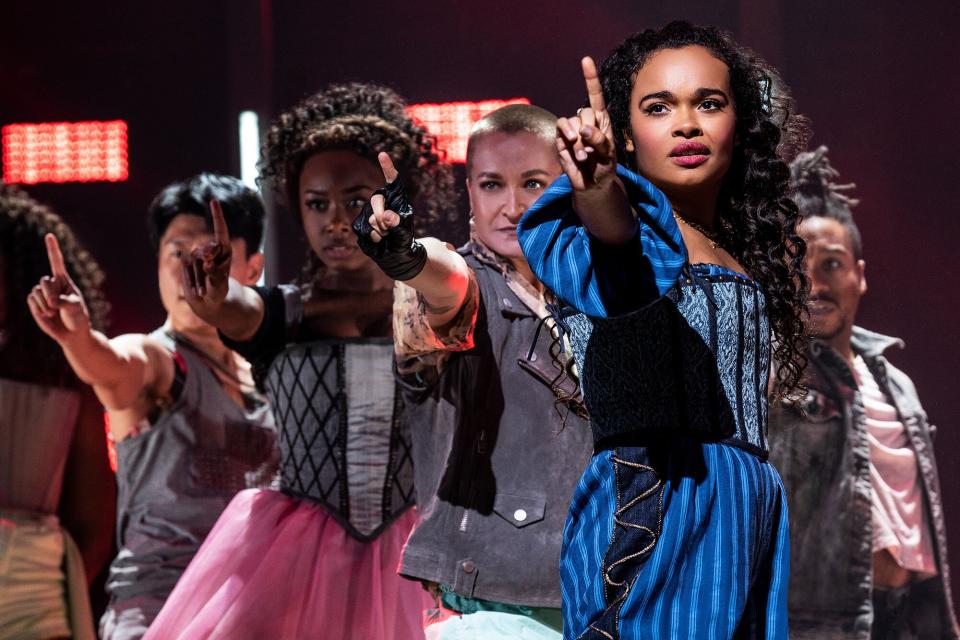
Matthew Murphy Joomin Hwang, Rachel Webb, Bobby 'Pocket' Horner, Lorna Courtney, and Virgil Gadson in '& Juliet'
ENTERTAINMENT WEEKLY: Josh, you love this show so much you named your dog Sweeney. What has it been like realizing this dream and what have you learned about yourself playing the role?
GROBAN: It's just a very serendipitous, fun thing whenever you have the opportunity to dive into something that you've loved for a really long time. I know I speak for the entire cast and creative team that this is a bucket list show for everybody. It's been out as long as I've been alive. For those of us that have had the great fortune of having those "a-ha!" moments as 12-year-olds in those theater seats where we say to ourselves, "If I could ever make somebody feel the way that I'm feeling right now, that would be my dream in life." So many of Sondheim's great shows did that for me at that age, Sweeney Todd being right at the top of that list. There is a great pressure with that. The fact that the stars aligned for it to actually happen is something I don't take for granted. The fact that I know that there are people out there who are that 13-year-old me that I get to carry the torch for is the greatest thrill.
Even though there's a part of me — because of my work process that likes to keep some of that story line out of my psyche so that it doesn't psych me out of the actual work that I have to do in service of the audience — I also really try and find the privilege of that joy that I get to go out there and I get to tell that story and I get to high-five that younger self. Everybody in this community has wanted this their entire lives. To be at the helm of that with this show, it's an extraordinary honor. I still have my George Hearn autographed photograph framed from when I asked him for an autograph at the Diary of Anne Frank when I was here looking at colleges. He probably still has no idea that that was for me, and now I'm doing that. That's why I keep gravitating back to this community.
ENTERTAINMENT WEEKLY: Sara, you've been on Broadway before and you've been nominated for your work writing a score for Watiress. How does this feel different?
BAREILLES: As a kid, I imagined myself on stage. So, when I started working on Waitress and I was on the creative team and writing music, I was so off the map of anything I had ever imagined for myself. I was stuck in the question of, "Can I even do this?" It felt impossible most of the time. I was so focused on trying to climb that mountain. The process of going through the Tony circuit at that point was completely exuberant and delicious, but it felt extraordinarily surreal in terms of my position. I am just a pig in s--- this time. I'm so excited. I feel so lucky. I'm so rooted in my childlike joy. This is the dream. This is the realization of singing into a hairbrush and listening to cast albums and imagining myself in costumes on stage. All of those very childlike fantasies of getting to be on a stage someday. The other piece of it is that the theater community is so sacred to me. I've always wanted to honor the invitation in by just trying to really do good work. It felt like this really beautiful acknowledgment or a validation in some way of like, "Okay, you can stay." The cool kids said I was okay. It matters so much to me. The work that gets done in the theater community is so essential to humanity. Competition's not my bag at all. We can get tricked into getting into the toxicity of a competitive environment. But this is a real celebration of this community at large and the work that theater makers do for the world. I believe it saves lives. It saved mine.
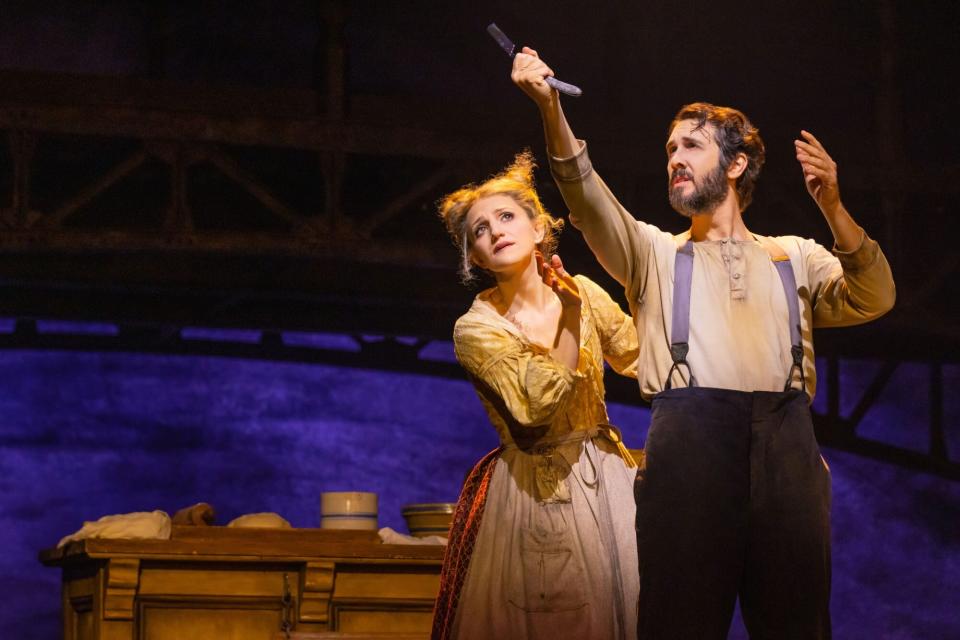
Matthew Murphy and Evan Zimmerman Annaleigh Ashford and Josh Groban in 'Sweeney Todd: The Demon Barber of Fleet Street'
ENTERTAINMENT WEEKLY: What is something in your show where the audience response to it has surprised you the most?
GROBAN: When I do my first kill and people applaud, that's, uh, that's a strange, dark realization. We've got the audience, but they may feel guilty about it on the ride home.
COURTNEY: In my show — I'm not in this number, I'm doing like a quick change — but after the song, "Everybody" [by the Backstreet Boys], which is a huge dance number with lights and the stage lifts, the applause and the screams last at least 60 to 90 seconds every single day. I wish that I could see what's going on on stage, but I feel it.
ARDEN: In Parade, at the end of Act One, Leo Frank is sentenced to hang and then it's intermission. I'm always fascinated by how people react. It's different every night. Some nights people are like, "Oh gee, what do I do?" Some people are like, "Oh, it's a big button of a number and I'm gonna applaud and go get my sippy cup of vodka." I love when audiences are torn between two things. I always try to get to the side and watch people at the end of the act. And Ben Platt stays on stage all of intermission. Because we jump two years, and I was like, "Fifteen minutes could represent two years in the theater. Sure." Some people are completely oblivious, like, "Where are we going for dinner?" right in front of him and some of the audiences sit with him and doesn't want to break. I love that it's all so different every night.
TESORI: I would say in Kimberly Akimbo, at the end of the show, there's something that's shown at the end of the show and it's really very funny. You hear people laughing, and then they start crying. Hearing this belly laugh turn into this belly cry — the first night that happened, I thought I'd never heard that before. It was not even crying through laughter or laughter through tears. It was one that had received the energy of the other. And I thought, "Well that's our show."
MOAYED: In A Doll's House, I have these three words I say that the entire audience gasps at the exact same time. Then it becomes the most quiet thousand people in a room ever. It turns so completely opposite. When you have no set or artifice or props or anything, all you have is this relationship with the audience and that relationship with the audience becomes very, dare I say, spiritual. So when that happens, it's a real turn.
BAREILLES: We brought boatloads of kids into these productions. Our cast was utterly multicultural and very diverse, and there were all kinds of people up on stage. Watching little girls, in particular girls of color, see Patina Miller stand in the middle of that stage and bring the house down every night was one of my favorite things. I would watch those little faces transfixed. But also, the little kids who would see [Philippa Soo] up there and Cole Thompson playing Jack and Joshua Henry — breaking the world of fairy tales open so that more people could see themselves on stage. This is the plight of theater, and we're making inroads. There's obviously more work to do. But kids have no theater decorum whatsoever, so they are yelling at things, they are interrupting all kinds of things with their joy and squeals and "Look at Her Mommy" and that stuff. It reminds you that's why we're here.
You can watch a condensed video of this roundtable conversation at the top of this article.
Check out more from EW's The Awardist, featuring exclusive interviews, analysis, and our podcast diving into all the highlights leading up to all the major award shows.
Related content:

